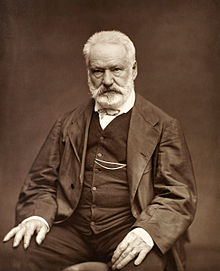
Back Victor Hugo Afrikaans Victor Hugo ALS Гюго, Виктор ALT ቪክቶር ኢውጎ Amharic Victor Hugo AN विक्टर ह्यूगो ANP فكتور هوغو Arabic ڤيكطور هيݣو ARY فيكتور هوجو ARZ Victor Hugo AST
Victor Hugo | |||||||||||||||||||||||||||||||||||||
|---|---|---|---|---|---|---|---|---|---|---|---|---|---|---|---|---|---|---|---|---|---|---|---|---|---|---|---|---|---|---|---|---|---|---|---|---|---|
 Portrait by Étienne Carjat, 1875 | |||||||||||||||||||||||||||||||||||||
| Born | Victor-Marie Hugo 26 February 1802 | ||||||||||||||||||||||||||||||||||||
| Died | 22 May 1885 (aged 83) Paris, France | ||||||||||||||||||||||||||||||||||||
| Resting place | Panthéon, Paris | ||||||||||||||||||||||||||||||||||||
| Occupations |
| ||||||||||||||||||||||||||||||||||||
| Political party |
| ||||||||||||||||||||||||||||||||||||
| Spouse | |||||||||||||||||||||||||||||||||||||
| Children |
| ||||||||||||||||||||||||||||||||||||
| Parents | |||||||||||||||||||||||||||||||||||||
| Writing career | |||||||||||||||||||||||||||||||||||||
| Genre |
| ||||||||||||||||||||||||||||||||||||
| Literary movement | Romanticism | ||||||||||||||||||||||||||||||||||||
| Years active | 1829–1883 | ||||||||||||||||||||||||||||||||||||
| Notable works | |||||||||||||||||||||||||||||||||||||
| Signature | |||||||||||||||||||||||||||||||||||||
| |||||||||||||||||||||||||||||||||||||
Victor-Marie Hugo, vicomte Hugo[1] (French: [viktɔʁ maʁi yɡo] ⓘ; 26 February 1802 – 22 May 1885) was a French Romantic author, poet, essayist, playwright, and politician. During a literary career that spanned more than sixty years, he wrote in a variety of genres and forms.
His most famous works are the novels The Hunchback of Notre-Dame (1831) and Les Misérables (1862). In France, Hugo is renowned for his poetry collections, such as Les Contemplations and La Légende des siècles (The Legend of the Ages). Hugo was at the forefront of the Romantic literary movement with his play Cromwell and drama Hernani. His works have inspired music, both during his lifetime and after his death, including the opera Rigoletto and the musicals Les Misérables and Notre-Dame de Paris. He produced more than 4,000 drawings in his lifetime, and campaigned for social causes such as the abolition of capital punishment and slavery.
Although he was a committed royalist when young, Hugo's views changed as the decades passed, and he became a passionate supporter of republicanism, serving in politics as both deputy and senator. His work touched upon most of the political and social issues and the artistic trends of his time. His opposition to absolutism, and his literary stature, established him as a national hero. Hugo died on 22 May 1885, aged 83. He was given a state funeral in the Panthéon of Paris, which was attended by over 2 million people, the largest in French history.[2]
- ^ "HUGO Marie-Victor, vicomte Hugo". Sénat (in French). 17 April 2024. Retrieved 17 April 2024.
- ^ Behrent, Megan (May 2013). "The enduring relevance of Victor Hugo". International Socialist Review (89). Retrieved 15 February 2015.